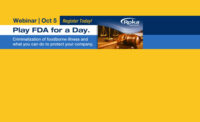Fighting Foodborne Pathogens
May 27/Food Weekly News -- According to recent research from South Korea, "In this study, we examined the chemical compositions of essential oil and tested the efficacy of oil and organic extracts of Cestrum nocturnum L. against food-borne pathogens. The chemical compositions of the oil was analysed by gas chromatography-mass spectrometry (GC-MS)."
"Forty-seven compounds representing 93.28% of the total oil were identified. The oil [5 mu L of 1:5 (v/v) dilution of oil with methanol] and organic extracts of hexane, chloroform, ethyl acetate and methanol (300 mu g per disc) of C. nocturnum displayed a great potential of antibacterial activity against Staphylococcus aureus (ATCC 6538 and KCTC 1916), Listeria monocytogenes (ATCC 19166 and ATCC 15313), Bacillus subtilis ATCC 6633, Pseudomonas aeruginosa KCTC 2004, Salmonella typhimurium KCTC 2515 and Escherichia coli ATCC 8739. Also the oil had strong detrimental effect on the viable count of the tested bacteria," wrote S.M. Alreza and colleagues, Daegu University.
The researchers concluded, "The results obtained from this study may contribute to the development of new antimicrobial agents with potential applications in food industries as natural preservatives to control food-borne pathogens."
Alreza and colleagues published their study in International Journal of Food Science and Technology ("Chemical Composition and Inhibitory Effect of Essential Oil and Organic Extracts of Cestrum nocturnum L. on Food-borne Pathogens." International Journal of Food Science and Technology, 2009;44(6):1176-1182).
For additional information, contact S.M. Alreza, Daegu University, Dept. of Biotechnology, Kyongsan 712714, Kyoungbook, South Korea.
From the June 8, 2009, Prepared Foods E-dition
Looking for a reprint of this article?
From high-res PDFs to custom plaques, order your copy today!




